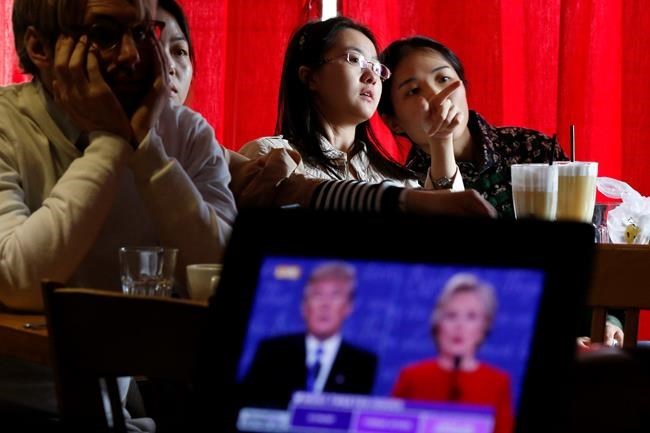
FILE - In this Tuesday, Sept. 27, 2016, file photo, Chinese students chat as they watch a live broadcast of the presidential debate between Democratic presidential candidate Hillary Clinton and Republican presidential candidate Donald Trump, at a cafe in Beijing. A survey released Wednesday, Oct. 5, 2016, found that Hillary Clinton is better liked than Donald Trump in China, where the U.S. presidential election - and the criticisms both candidates have made of Chinese policy - have generated intense attention. (AP Photo/Andy Wong, File)
October 05, 2016 - 7:03 AM
BEIJING - A survey released Wednesday found that Hillary Clinton is better liked than Donald Trump in China, where the U.S. presidential election — and the criticisms both candidates have made of Chinese policy — have generated intense attention.
Clinton was seen favourably by 37 per cent of respondents in a survey in mainland China conducted by the Washington, D.C.-based Pew Research Center, while just 22 per cent saw Trump favourably. At the same time, 35 per cent of respondents saw Clinton unfavourably, while 40 per cent had an unfavourable impression of Trump.
The survey found that Chinese interest in America comes with strong skepticism. More than 80 per cent of respondents said they considered the U.S. to be a threat to China.
While the Pew survey has no bearing on the U.S. election, it offers a rare glimpse of the opinions of ordinary Chinese, whose views can be hard to discern due to China's censorship of the media and social media channels. State-sanctioned newspapers often publish nationalistic commentaries that deride American policies, but the survey suggests the public has a more nuanced opinion of the U.S.
President Barack Obama was seen favourably by 52 per cent of respondents, up from 31 per cent in a similar survey in 2013 but still below 62 per cent shortly after he took office in 2009.
The next president will have to work with China on several important fronts. On issues like climate change, both countries have found some common ground and jointly announced last month that they would join an international agreement to cut carbon emissions. On others, like the South China Sea and North Korea's nuclear weapons program, Beijing and Washington are deeply divided.
Chinese state broadcaster CCTV provides selective and largely sporadic coverage of the U.S. presidential election. But ever-growing numbers of Chinese tourists, immigrants and students are travelling to the U.S. and seeking information about the country on the internet. Pirated versions of American political dramas such as Netflix's "House of Cards" are widely watched in China. Among the reported fans of "House of Cards" is Wang Qishan, a member of China's highest decision-making body, the Politburo standing committee.
Pew's survey was conducted between April 6 and May 8 and included in-person interviews with more than 3,100 Chinese. Pew said it had a margin of error of 3.7 percentage points. Participants were asked how much confidence they had in Obama, Clinton and Trump to "do the right thing regarding world affairs."
Clinton has a longer history of engagement with China than Trump, dating back more than two decades to her famous 1995 speech in Beijing in which the then-first lady declared that "human rights are women's rights, and women's rights are human rights." As secretary of state, Clinton oversaw the American "pivot" to the Pacific, a hallmark of Obama's foreign policy that's been derided by China.
Trump has made some of his signature clothing line in China and boasted during the campaign of his dealings with Chinese businessmen. But he has repeatedly blamed China for the loss of American jobs and accused China of cheating at global trade. His campaign website says he would use "every lawful presidential power" to punish China if it "does not stop its illegal activities, including its theft of American trade secrets."
While Chinese leaders have not publicly indicated their preference, the state-run Global Times newspaper, published by the Communist Party, has ripped both candidates, though Trump has generally received tougher criticism than Clinton. A September commentary on the first U.S. presidential debate called Trump "seemingly unprepared and ill-informed," but dismissed Clinton for "her poor performance as secretary of state, let alone her credibility issues."
China has also lashed out at the Republican Party over its criticisms of Beijing, accusing it of levelling groundless accusations and meddling in China's internal affairs.
Zhang Ming, a political science professor at Beijing's Renmin University who was not involved in the Pew survey, said he's found opinions vary widely on the two candidates, depending in large part on how people feel about China itself.
"Some Chinese agree with government policies, so they hope the candidate who wins the election will be friendly toward China," Zhang said. "Some people may want the new president to interfere in some issues in China if they disagree with government policy."
___
Associated Press researcher Henry Hou contributed to this report.
___
Follow Nomaan Merchant on Twitter at twitter.com/nomaanmerchant
News from © The Associated Press, 2016